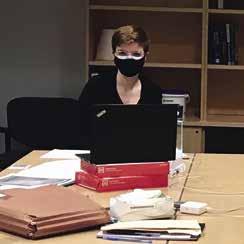
3 minute read
A Clinic Student Changes A Life
As she walked into the Law School building in early March, Sam Gagnon ’21 experienced a bit of a time warp. About a year ago, as a student in the Law School’s in-house Child Advocacy Clinic, she was assigned to represent a young man who had fled his native Honduras as a victim of violence, poor living conditions, and parental neglect. She was tasked with helping him gain Special Immigrant Juvenile Status (SIJS) so he could stay in the United States legally in his older brother’s care. Under the supervision of the Clinic’s director, Professor Jennifer Baum, Gagnon started preparing for the Special Findings Order hearing that was a first step in the SIJS process.
Then the pandemic hit.
“Everything came to a full stop,” Gagnon says about the court closures with the COVID-19 lockdown in and beyond New York City. “So, along with our client, we had no choice but to wait it out until the court re-opened for virtual business and called our case.” When that time finally arrived, Gagnon was ready to pick up where she had left off and advocate for a result that would change her client’s life.
“Preparing for a hearing like this involves a lot of moving parts, and the most significant one was helping my client and his brother practice direct examinations, so they knew what to expect at trial and so we could help them best tell their stories,” says Gagnon. Assisted by fellow St. John’s Law students who acted as Spanish interpreters, and guided by Professor Baum, Gagnon met virtually with her client and his brother three times in the week leading up to the hearing, for two to four hours each time. “The toughest part was going over some of the worst parts of my client’s life over and over again,” she shares. “It can be an emotionally draining experience on both sides of the camera.”
To ready the case, Gagnon also had to marshal a range of knowledge and skills honed at St. John’s Law. “As I mentored her, it was wonderful to see Sam pull together almost three years of law school classes to guide the clients through the procedure and laws of the hearing,” Professor Baum says. “She called on her knowledge of civil procedure, legal writing, family law, children and the law, evidence, professional responsibility, and more.” Along with setting this legal foundation, Gagnon and Professor Baum took the time to reacquaint with their client on a personal level. “We talked about college, and soccer, and the child’s love of Long Island Chinese food, and the older brother’s dream of starting a community banking system one day,” Professor Baum says, adding, “I do believe Sam and I learned as much from these two young and hopeful new Americans as they did from us.”
As the virtual hearing date approached, Gagnon and Professor Baum decided that it would be best for the Clinic advocates, their client, and his brother to all be together physically in the same room for the proceeding. “In addition to the practical benefits of conducting our end of the hearing in person, it was profoundly normalizing to be together, while observing social distancing, for this litigation,” Professor Baum explains. “For me in particular, it felt like a sign that our students were carefully leading us back, little by little, to the world we all left behind before the pandemic.”
Gathered in a makeshift hearing room at the Law School, and connected virtually to the judge presiding in Nassau County Family Court, Gagnon was less nervous than she expected to be for her first court appearance. And she maintained her composure as she navigated technical glitches, issues with the court’s interpreter, and an unexpectedly truncated direct examination. Afterwards, it took the judge just 10 minutes to render her decision granting the Clinic client SIJS.
“Admittedly, it was disappointing to miss out on the opportunity to do full direct examinations, especially with the many hours of preparation we had all put in,” Gagnon says. “With all of this being said, the hearing was a success, and that is truly all we could have hoped for. It felt unbelievable going to bed that night knowing our client can sleep a little sounder with a bright future in the United States ahead of him. I’m humbled and grateful to have played a small role in it.”










